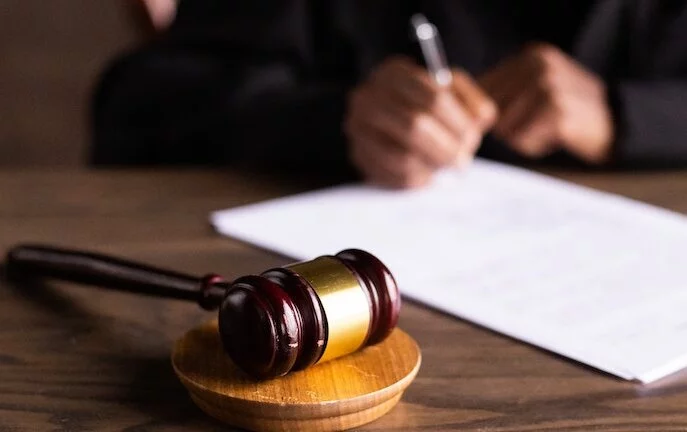
How Much Mortgage Deposit Do I Need with a CCJ?
Find out how much you need in mortgage deposit with a CCJ on your credit file. We explain the impact CCJs can have on your mortgage, your options & more here.
Speak to a bad credit mortgage adviser
Fill out this enquiry form and we’ll contact you to book a free call with one of our mortgage experts.
"*" indicates required fields
If you have a CCJ (county court judgement) against you, it can make getting a mortgage more difficult. Many high-street lenders will not approve mortgages for people who have CCJs, and those that do may require a larger deposit.
The good news is that this isn’t the same for all lenders. Whether you need a larger deposit to get a mortgage with a CCJ will depend on the CCJ itself as well as that specific lender’s criteria.
In this guide, we will discuss how much deposit you need to save to get a mortgage with a CCJ. We will also provide some tips on how to improve your credit score and how to find lenders that will consider your application.
Contents
What Is a CCJ?
A CCJ stands for county court judgment and it is a legally binding verdict made by a judge that someone has failed to pay a debt. If you have been in this situation, you will have received a document from the court with details of the judgement and the amount of money you owe. A CCJ stays on your credit file for 6 years and having one can negatively affect your chances of getting any kind of loan or finance, such as a mortgage or car purchase. This is because it can lead to a poor credit score and/or tarnish your credit record, which is something that lenders consider when assessing loan applications.
CCJs can be satisfied or unsatisfied. A satisfied CCJ is one that has been paid in full, while an unsatisfied CCJ is one that is still outstanding. Your credit report will show whether a CCJ is satisfied or unsatisfied — meaning lenders can see whether you’ve taken any steps to rectify the situation.
You’ll stand a better chance of getting a more competitive mortgage deal with a satisfied CCJ than an unsatisfied one.
How Much Deposit Do I Need to Save to Get a Mortgage with a CCJ?
The amount of mortgage deposit with a CCJ varies depending on the lender. There are some lenders that may still be able to consider a higher LTV at 90% or even 95%. But, each lender has different criteria when it comes to CCJs, so ultimately the products available depends on your situation and whether the lender is willing to consider your application or not.
Some lenders may require a larger deposit depending on their criteria, your situation and the circumstances surrounding the CCJ – e.g. if you’ve had more than one CCJ, how long ago it occurred, whether it’s been satisfied, how much it was regarding, etc. Many lenders have different tiers of products and the amount of deposit required may change according to the product tier. For example, if you only had one CCJ 5 years ago of £1,000 your deposit requirement will be lower than someone who had multiple CCJs 1 year ago of over £4,000.

What Are the Deposit Levels for a Mortgage with a CCJ?
Most lenders offer different tiers of products when it comes to mortgages with CCJs. These usually range from a low tier, which often requires a minimum deposit of 10%, to a high tier which can require up to 25%. The higher the risk you pose to the lender, the higher the deposit required.
While it’s likely that your deposit requirement will be higher if you have a CCJ, there are some lenders who offer products with smaller deposit requirements for people with good credit scores despite a bad credit event like a CCJ on their file. Generally, if you have a poor credit score, this will influence the size of the deposit you need.
The deposit requirement is just one aspect of getting a mortgage with a CCJ. You must also meet the lender’s criteria in terms of income, affordability, credit score, etc.

What Factors Will Lenders Consider?
When you apply for a mortgage with a CCJ, the lender will look at several factors pertaining to the debt. This includes the below.
The size of the CCJs
The bigger the CCJs, the more likely it is that a lender will want you to have a larger deposit. For example, a CCJ under £2,500 may be considered more leniently than one for £4,000 or over. This could mean the difference between a 15% – 25% deposit.
If the CCJ has already been satisfied
A satisfied CCJ shows that you have taken steps to resolve any problems and are managing your money better. In some cases, an already satisfied CCJ might mean that you don’t need a larger deposit, although this isn’t always the case.
Many specialist mortgage lenders are still willing to consider applications from people who have unsatisfied CCJs, but they will likely require a larger deposit and charge a higher interest rate.
The timeframe in which your CCJ was satisfied
The time it took you to settle your CCJ can also have an effect on the amount of deposit that you need to save. If you settled it quickly, this will look better in the eyes of potential lenders as it shows that you’re taking steps to resolve any debt problems quickly and responsibly. This will show that you’re more likely to make your monthly mortgage payments on time.
The number of CCJS
Having multiple CCJs can make it harder to get a mortgage and you may be required to pay a larger deposit if you have more than one. The more CCJs you have, the less likely it is that a lender will consider your application favourably. This is because it raises a red flag with lenders, as it could be a sign that you have a problem with debt management or aren’t managing your finances well.
The date of the CCJ
Lenders look at when the CCJ was issued to assess how long you have been managing your finances responsibly. If the CCJ is recent, then it may be harder for you to get a mortgage with a lower deposit requirement. However, if you had a CCJ over 24 months ago and can prove that you’ve kept a good track record since, then you may be seen as less of a risk and not be required to pay a higher mortgage deposit with a CCJ.
Whether there was a dispute
If you can prove that the CCJ was a result of a dispute, then this could potentially help your application. Lenders may be more understanding if there is evidence to suggest that the debt wasn’t due to financial negligence on your part and thus not require such a high deposit. For example, the CCJ could be due to a relationship breakdown or a dispute with a business. If this is the case, then you could explain this to your lender and they may be more flexible. If you have any documentation to back up your dispute, send this along with your application.
What Mortgage Deposit Do I Need with Satisfied CCJ?
The amount of deposit required for a mortgage with a satisfied CCJ varies between lenders based on the factors outlined above. Some lenders may be willing to accept lower deposits, as long as your credit history and financial situation are favourable and there isn’t any evidence of other debt management problems. It’s worth speaking to a specialist mortgage adviser at John Charcol who can advise on the most suitable lender and products for your circumstances.
How Can I Improve My Chances of Securing a Lower Deposit Mortgage with a CCJ?
There are still ways to improve your chances of securing a mortgage with a lower deposit requirement.
Decrease your debt-to-income ratio
Your debt-to-income ratio is a measure of how much debt you have in relation to your monthly income. A high debt-to-income ratio can be seen as a sign of financial difficulty and could damage your credit score. To improve this, try to pay off some existing debts as soon as possible and avoid taking on any more.
Keep a steady and consistent income
Maintaining a steady and consistent income can help you to prove to lenders that you’re managing your finances responsibly. This will make them more likely to approve you for a mortgage with a lower deposit requirement, as they can be sure that you’ll have the means to make your monthly payments.
Go through an independent, specialist mortgage broker
Independent, specialist mortgage brokers — such as John Charcol — can help to find the best product for your situation. We have access to a range of products from different lenders and understand what is available for people with less-than-perfect credit scores. We’re experienced in working with a vast network of specialist lenders to secure loans with the lowest deposit requirement despite having a CCJ.
Improve your credit score
Improving your credit score will increase your chances of mortgage approval with favourable terms. Lenders are more lenient if they know you’re now in a strong financial position.

How Can I Improve My Credit Score After Getting a CCJ?
If you have a CCJ, then it’s likely that you’ll have a poor credit score. Where possible, take steps to improve your credit score before applying for a mortgage, in order to secure better terms. Here are some tips to improve your credit score:
Check your credit report for accuracy and dispute any errors
Make sure that all the information on your credit report is accurate, as this can affect how lenders view your application. If there are any errors or discrepancies, you should dispute them with the relevant credit reference agency as soon as possible. Additionally, make sure that any information that is outdated is updated.
Pay off existing debts
By paying off any existing debts in full and on time, you can demonstrate to lenders that you’re in control of your finances and know how to manage them responsibly. This will help to improve your credit score over time. Settled defaults are viewed more favourably than unsettled ones.
Avoid applying for credit unnecessarily
Try to avoid applying for too much credit at once, as this can be seen as a sign of financial difficulty. For example, applying for an overdraft and mismanaging it could damage your credit score further. Plus, if you’re rejected for further credit, it could also have an adverse effect on your score.
Set up direct debits/standing orders
Setting up direct debits and standing orders to ensure on-time payments will show lenders that you can manage your finances effectively. It will also prevent you from forgetting payments, which could damage your credit rating further.
How Can I Find Lenders That Accept CCJs?
If you have a CCJ, then it can be difficult to find lenders that are willing to offer you a mortgage. You’ll likely be rejected by high-street banks such as HSBC and Santander, so it’s worth looking into specialist lenders that are more likely to accept a CCJ.
We understand that finding the right lender can be difficult, which is why we at John Charcol are here to help. We have access across the whole market so we can find the best mortgage for your needs. We also work with adverse credit lenders that only operate through intermediaries, giving you access to more and better deals. Rather than taking a shot in the dark and going through the stress of being rejected multiple times, let us do all the hard work for you.

The Takeaway on Mortgage Deposits with a CCJ
Overall, the amount of deposit required to get a mortgage with a CCJ depends on the individual lender and your personal circumstances. If you’re able to meet certain criteria and prove that you have been managing your finances responsibly since the CCJ, then this could help to reduce the mortgage deposit with CCJ requirements.
Using a reputable specialist mortgage broker like John Charcol will make it much easier to find the best product with the most favourable terms for your situation. We can help you secure a mortgage with the lowest possible deposit requirements, getting you a great deal despite CCJs. Get in touch today on 0808 258 4955 to make the first step towards owning your own home.
Related Articles
It's Simple With Us
Talk to Our Experts Today
